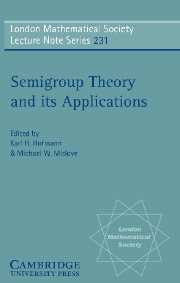 Semigroup Theory and its Applications
Semigroup Theory and its Applications Book contents
- Frontmatter
- Contents
- Foreword
- Reminiscences of a friendship
- I Historical Perspective
- II Current Trends
- III New Directions
- Maps implicit in the Jordan-Hölder theorem
- Finite semigroups as categories, ordered semigroups or compact semigroups
- Principles underlying the degeneracy of models of the untyped lambda calculus
Principles underlying the degeneracy of models of the untyped lambda calculus
Published online by Cambridge University Press: 05 April 2013
- Frontmatter
- Contents
- Foreword
- Reminiscences of a friendship
- I Historical Perspective
- II Current Trends
- III New Directions
- Maps implicit in the Jordan-Hölder theorem
- Finite semigroups as categories, ordered semigroups or compact semigroups
- Principles underlying the degeneracy of models of the untyped lambda calculus
Summary
Introduction
The lambda calculus began as an attempt by Alonzo Church to give a foundation for mathematics based on functions rather than sets. As such, it inherently is a theory of functions. While interest in the theory was confined to logicians for quite some time, more recently it has received extensive attention from the theoretical computer science community, which took it up because of its emphasis on the computational aspects of functions. The lambda calculus has been a focus of research in the semantics of programming languages in recent years, and this area has become a major contributor to the development of the theory.
Category theory is another theory of functions, but one with quite different beginnings. It began in an attempt to abstract away from the details of specific areas of mathematics in order to provide a uniform setting in which results common to many areas could be formulated and proved. Category theory also plays a fundamental role in theoretical computer science, precisely because it provides a setting that is broad and rich enough to accommodate the many requirements needed to give mathematical models for programming languages.
It is only natural then that these two theories of functions should have a close relationship. One only has to consult works such as Asperti and Longo [2] and the earlier Lambek and Scott [8] to see ample evidence of the richness of the relationship between category theory and the typed lambda calculus.
- Type
- Chapter
- Information
- Semigroup Theory and its ApplicationsProceedings of the 1994 Conference Commemorating the Work of Alfred H. Clifford, pp. 123 - 156Publisher: Cambridge University PressPrint publication year: 1996
- 1
- Cited by
